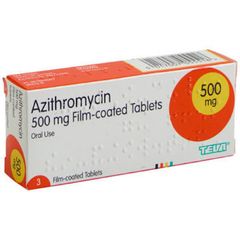- Home
- Treatments (Medications)
- Travellers Diarrhoea
Travellers Diarrhoea
Travellers' Diarrhoea is a common holiday illness caused by contaminated food or water. Effective diarrhoea treatments can be prescribed through Chemist Doctor before your trip after assessment by UK doctors. Being prepared helps ensure trip enjoyment.
Find Travellers Diarrhoea Treatments

Azithromycin Tablets
What Causes Travellers' Diarrhoea?
While exploring tropical regions like Southeast Asia or Sub-Saharan Africa, up to 50% of visitors experience travellers' diarrhoea - typically within their first week abroad. This occurs when unfamiliar bacterial strains overwhelm your digestive defences.
Primary Pathogens
- Enterotoxigenic E. coli (ETEC): Causes 80% of cases through toxin production
- Campylobacter jejuni: Common in undercooked poultry
- Shigella spp.: Spread via faecal-oral transmission
These microbes thrive in environments with:
- Inadequate food refrigeration
- Untreated water supplies
- Poor hand hygiene practices
Recognising Key Symptoms
Travellers' diarrhoea manifests through distinct NHS-recognised symptoms:
Symptom Timeline
- First 24 Hours: Mild abdominal cramping, loose stools
- Days 2-3: Watery diarrhoea (5-10x daily), nausea
- Beyond 72 Hours: Risk of dehydration escalates
When to Seek Urgent Care
Immediate GP consultation is crucial if experiencing:
- Blood/mucus in stools
- Persistent vomiting preventing fluid intake
- Reduced urination or dark urine
Health Risks and Complications
While generally self-limiting, 10-15% of cases develop:
| Complication | Management Approach |
|---|---|
| Chronic IBS | Dietary modification |
| Reactive arthritis | Anti-inflammatory therapy |
First-Line Treatment Strategies for Travellers' Diarrhoea
Initial management of travellers' diarrhoea focuses on:
- Loperamide (Imodium®): Reduces bowel movements (Max 8 capsules/24hrs)
- Oral Rehydration Salts (ORS): WHO-approved glucose-electrolyte solution
- Early Antibiotic Use: Shown to reduce duration by 24-36 hours (NICE Guidelines)
Targeted Antibiotic Therapy for Travellers' Diarrhoea
| Destination | First-Line Antibiotic | Dosage | Efficacy |
|---|---|---|---|
| South/Southeast Asia | Azithromycin | 1000mg single dose | 94% resolution in 72hrs |
| Africa/Latin America | Ciprofloxacin | 500mg twice daily (3 days) | 88% efficacy |
| All Regions | Rifaximin | 200mg TDS (3 days) | 85% success rate |
Emergency Management of Severe Cases
Symptom Escalation Protocol
- Hour 0-6: Initiate ORS + single-dose antibiotic
- Hour 6-12: Add loperamide if no bloody stools
- Hour 24+: Clinical review if no improvement
Red flags requiring immediate GP consultation:
- Blood/mucus in stool
- Fever >39°C with rigors
- Signs of dehydration (reduced skin turgor)
Proven Prevention Strategies
Food Safety Hierarchy
- High Risk: Raw shellfish, street vendor juices, unbottled water
- Moderate Risk: Peeled fruits, buffet sauces
- Safe: Steam-hot foods, factory-sealed beverages
Hygiene Essentials Kit
- Alcohol-based hand sanitiser (60-95%)
- Portable water purification tablets
- Disposable antiseptic wipes
OTC Solutions and Supportive Care
For mild cases (<3 stools/day):
- Loperamide: 4mg initial dose, then 2mg after each stool
- Zinc Supplements: 20mg/day reduces duration by 30%
- Probiotics: Saccharomyces boulardii CNCM I-745 strain
Where Can I Buy Traveller's Diarrhoea Treatment Online in the UK
Secure Travel Medication Kits & Next-Day Delivery Service
Order traveller's diarrhoea treatment with confidence through our UK-registered prescribers. All requests are reviewed within 4 working hours, with eligible patients receiving same-day prescriptions. Orders placed before 3pm dispatch for next-day tracked delivery.
Our service provides:
- Oral rehydration salts (Dioralyte® or equivalent)
- Loperamide (Imodium®) for adults only
- Standby antibiotics (where clinically appropriate)
Our clinical team ensures:
- Destination-specific risk assessment
- Medical history review (including kidney function)
- Clear treatment protocols based on NHS Fit for Travel guidelines
Not a substitute for medical care: Seek immediate help if experiencing bloody diarrhoea, fever, or dehydration symptoms. Antibiotics are only prescribed when meeting strict criteria.
Traveller's Diarrhoea FAQs
What is traveller's diarrhoea?
Traveller's diarrhoea is a gastrointestinal condition typically contracted during or after international travel, resulting from ingestion of food or water contaminated with pathogenic microbes. Symptoms usually resolve within several days but may persist beyond one week in some cases. Associated symptoms can include fever, vomiting and abdominal cramping.
Is traveller's diarrhoea contagious?
Yes, traveller's diarrhoea is highly transmissible whether caused by viral, bacterial or parasitic pathogens. Transmission occurs through faecal-oral route via contaminated surfaces, food or water. Causative pathogens can survive on surfaces for several days, necessitating strict hygiene practices including hand disinfection and surface sanitisation to prevent spread.
Should I eat during a bout of traveller's diarrhoea?
Patients may consume simple, non-irritating foods if not experiencing nausea or vomiting, particularly when undergoing antibiotic treatment. Avoid dairy products which may prolong symptoms. The BRAT diet (bananas, rice, applesauce, toast) is often recommended. Seek medical consultation if symptoms persist beyond seven days.
What is the appropriate management of traveller's diarrhoea?
Pre-travel preparation for high-risk regions should include carrying appropriate antibiotics. During active illness: maintain hydration with oral rehydration solutions, rest adequately, and replace lost electrolytes. Seek urgent medical assessment if diarrhoea persists beyond 72 hours, features bloody stools, or shows no improvement with initial treatment.
What causes traveller's diarrhoea?
Contaminated food represents the most common vector, with enterotoxigenic Escherichia coli (ETEC) being the predominant bacterial cause. Multiple pathogens including norovirus, Campylobacter, Shigella, and parasitic organisms like Giardia may produce clinically identical presentations.
What is the typical duration of traveller's diarrhoea?
Acute symptoms generally resolve within 3-4 days, though 10-15% of cases persist beyond one week. Complications may include bloody stools (occurring in approximately 10% of cases) or vomiting (affecting 15% of patients). Prompt rehydration and appropriate antimicrobial therapy when indicated can reduce duration.
 | Authored by Nabeel |
Medical Content Manager
Nabeel is a co-founder, and medical content manager of Chemist Doctor. He works closely with our medical team to ensure the information is accurate and up-to-date.
 | Reviewed by Dr. Feroz (GMC:7921697) |
Medical Doctor
Dr. Feroz is a GMC-registered doctor and a medical reviewer at Chemist Doctor. He oversees acute condition and urgent care guidance.
 | Approved by Usman |
Medical Director
Usman is a co-founder, and medical director of Chemist Doctor. He leads the organisation's strategic vision, bridging clinical and operational priorities.
Review Date: 29 May 2025
Next Review: 23 December 2025
Published on: 29 May 2025
Last Updated: 30 May 2025







